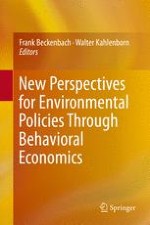2016 | OriginalPaper | Chapter
8. Environmental Behavior and Fast and Frugal Heuristics
Authors : Florian M. Artinger, Ana Paula Bortoleto, Konstantinos V. Katsikopoulos
Published in: New Perspectives for Environmental Policies Through Behavioral Economics
Publisher: Springer International Publishing
Activate our intelligent search to find suitable subject content or patents.
Select sections of text to find matching patents with Artificial Intelligence. powered by
Select sections of text to find additional relevant content using AI-assisted search. powered by
